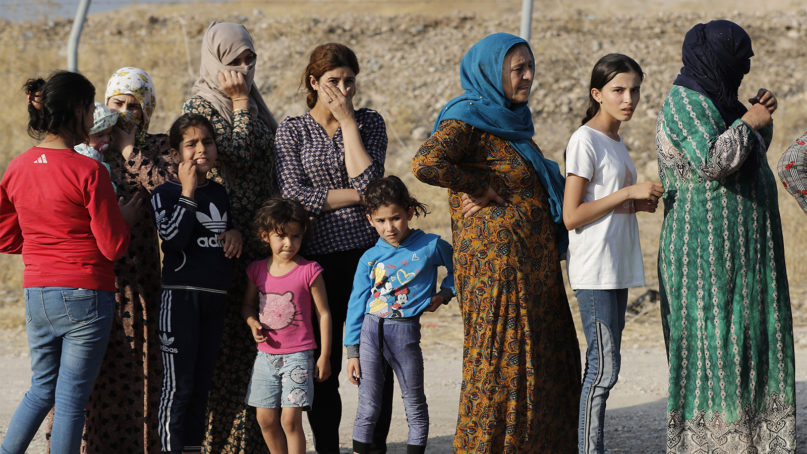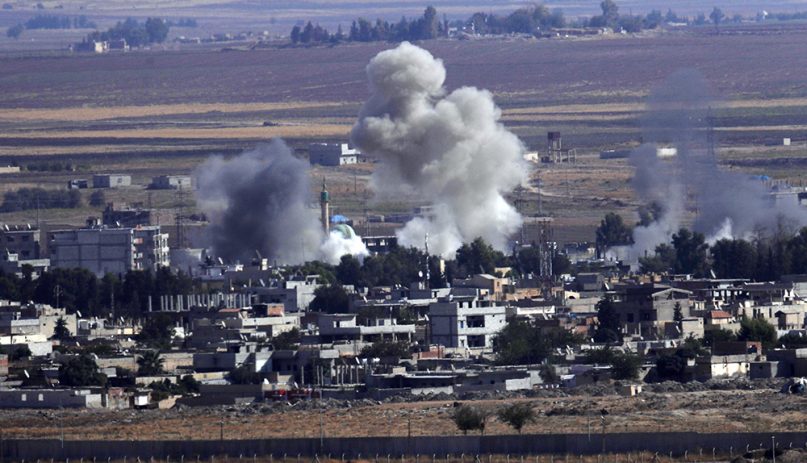
Smoke and dust billow from targets in Ras al-Ayn, Syria, caused by bombardment by Turkish forces, on Oct. 15, 2019, seen from southeastern Turkey. Turkish artillery on Tuesday pounded suspected Syrian Kurdish positions near the town in northeast Syria amid reports that Kurdish fighters had retaken the town as Turkey pressed ahead with a military incursion that has drawn widespread condemnation. (AP Photo/Lefteris Pitarakis)
(RNS) — “Who will die, and who will live?”
If you were in synagogue during this season of awe, you know those words. They are the words of the prayer we call the Unetaneh Tokef, perhaps the liturgical high moment of the liturgy.
I will tell you who will die.
The Kurds will die. The Kurds are already dying, because the Trump administration has abandoned them.
Is there a nation in the Middle East more hapless than the Kurds? They are the fourth largest ethnic group in the region. They inhabit a region that straddles the borders of Turkey, northeastern Syria, Armenia, Iran and Iraq. After the defeat of the Ottoman Empire, the 1920 Treaty of Sevres promised them a state. It never happened. The Kurds are a stateless people.
The Kurds have been our allies in the fight against ISIS. This administration has given tacit permission to the Turks to repeat what they did to the Armenians a hundred years ago. It is called ethnic cleaning. Thousands of Kurdish civilians have already fled their homes. They have become refugees.
More than this: Our withdrawal of troops from northern Syria has given ISIS free rein once again. Some of the most dangerous terrorists on the planet are now free — free to bring their war to these shores. What has happened is beyond incomprehensible. It represents the greatest moral failure of American foreign policy in recent memory.
Let us ask ourselves: Where are the demonstrations on college campuses in favor of the Kurds? Where is Ilhan Omar’s voice? Where is Rashida Tlaib’s voice?
Oh, I forgot.
Those poor Kurds. They had the unmitigated chutzpah to find themselves involved in a humanitarian disaster that has nothing to do with Israel.
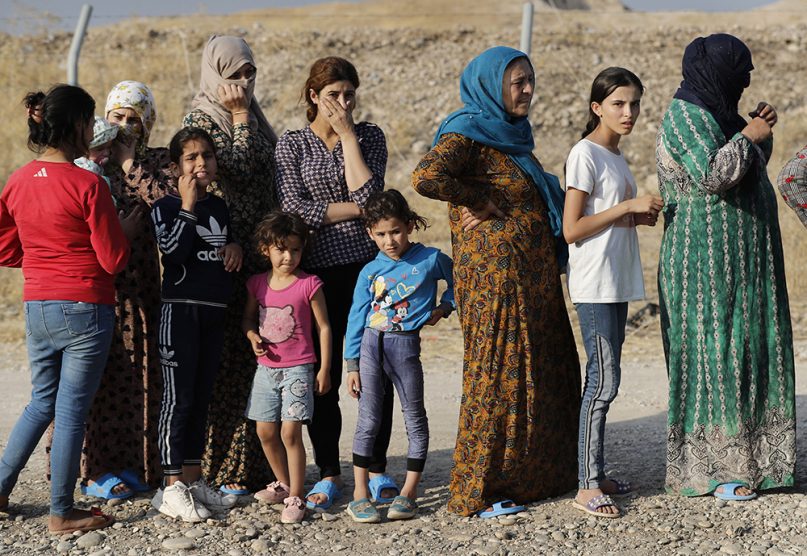
Syrian women, many ethnic Kurds, who were displaced by the Turkish military operation in northeastern Syria line up to receive aid and food supplies at the Bardarash refugee camp, north of Mosul, Iraq, on Oct. 17, 2019. Hundreds of Kurdish refugees have crossed into Iraq in the past week, mostly through unofficial border points. On Wednesday, a first group of 890 people were bused to the Bardarash camp, in northern Iraq’s semi-autonomous Kurdish region, which up until two years ago housed displaced people from Mosul. (AP Photo/Hussein Malla)
Which has not stopped Israelis from speaking up – from turning their voices into human imitations of the blasts of the shofar.
Dozens of Israel Defense Forces reservists have called on Israel to provide military and humanitarian support to the Kurds in Syria, and they sent a petition to Prime Minister Benjamin Netanyahu.
This is what the petition said:
We, as Israelis and Jews, must not stand by when we see another nation abandoned by its allies and left defenseless. We remember very well the blood of our people, what happens when the nations of the world abandon the fate of a people. Israel is a country that has the means to help the Kurdish people, and now is the time to do so.
During this sacred season of introspection, I have had a book open before me — “Refugees in America: Stories of Courage, Resilience, and Hope in Their Own Words,” by Rabbi Lee Bycel (disclosure: Rabbi Bycel is a close friend of mine).
Rabbi Bycel’s book is a tour de force. It is a haggadah — stories of people who have left their own Egypts and who are now in their own versions of the wilderness.
What is the official definition of a refugee, according to the United Nations?
A refugee is “someone who has been forced to flee his or her country because of persecution, war or violence. A refugee has a well-founded fear of persecution for reasons of race, religion, nationality, political opinion or membership in a social group.”
The philosopher Hannah Arendt, herself a refugee from Nazi Germany, put it this way: “We lost our home, which means the familiarity of daily life. We lost our occupation, which means the confidence that we are of some use in this world. We lost our language, which means the naturalness of reactions, the simplicity of gestures, the unaffected expressions of feelings.”
If the Kurds represent one set of stories of refugees, let me offer you another: those of their close neighbors, the Yazidis, which Rabbi Bycel highlights.
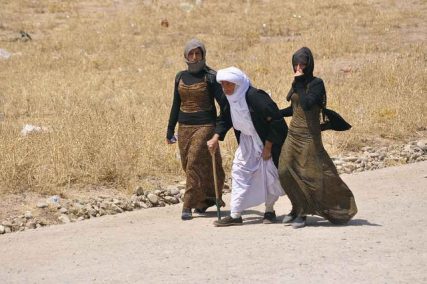
Yazidi women in Iraq in 2014. Photo courtesy of Domenico/Creative Commons
The Yazidis are an ethnic and religious minority living predominantly in Iraq and Syria. Their religion is one of the oldest in the world.
One of their major centers is Haran, which is where Abraham sojourned on his way from Ur. Yet another is Mosul, which we know by its ancient name, Nineveh — the evil city that was to be the target of Jonah’s prophecy.
The Yazidis have long been victims of persecution at the hands of the Muslims. In August 2014, ISIS began to exterminate the Iraqi Yazidi population. ISIS fighters destroyed Yazidi villages; they executed hundreds of Yazidi men; they enslaved hundreds of Yazidi women. In that one month alone, 10,000 Yazidis were killed or enslaved. Fifty thousand Yazidis fled to Mount Sinjar, where they were trapped until Kurdish forces saved them.
These are the words of Asinja Badeel, a Yazidi refugee.
The Muslims consider us infidels and accuse us of not worshipping God. They killed us many times through history and every time they destroyed our culture, our temples and our books. They killed our most educated people, so that that we didn’t want to talk about our religion anymore. My mother told me to say I am Yazidi, but nothing more. My grandfather said not to write anything down because if we document what we are worshipping, they will kill us for sure.
Years ago, singer Tom Petty recorded his hit song “You Don’t Have To Live Like A Refugee.”
While we don’t have to live like refugees, we do have to remember what it means to live like a refugee.
Sukkot, which Jews are observing this week, is the festival of the refugee.
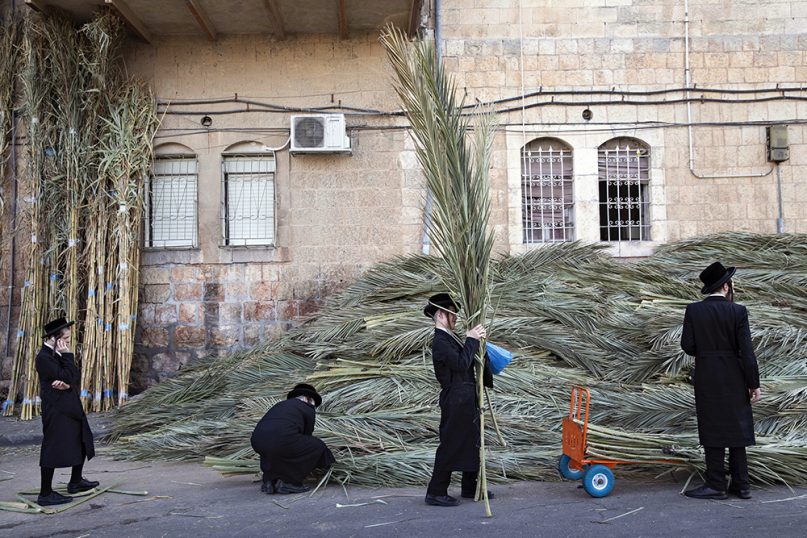
Ultra-Orthodox Jews buy palm fronds to build sukkahs ahead of the upcoming Jewish holiday of Sukkot, in the Orthodox Jewish neighborhood of Mea Shearim in Jerusalem, on Oct. 10, 2019. The holiday commemorates the Israelites’ 40 years of wandering in the desert and a decorated hut, or sukkah, is erected outside religious households as a sign of temporary shelter. (AP Photo/Oded Balilty)
Consider the mystical custom of ushpizin – the act of inviting ancient biblical heroes into the sukkah, one for each night of Sukkot — Abraham, Isaac, Jacob, Joseph, Moses, Aaron and David.
What do these heroes have in common?
It is very simple. They were refugees.
So were their descendants, and so were our ancestors. There is no one reading this who is not the descendant of a refugee.
Caring for refugees is in the moral wheelhouse of the Jewish people. That was why Robert Bowers attacked Tree of Life Synagogue in Pittsburgh almost a year ago — because one of the congregations that uses that synagogue had the chutzpah to support HIAS, whose mission is caring for refugees and immigrants.
On Sukkot, we begin by thinking of the betrayal of the Kurds.
But we end by remembering that this is our story as well. America, we said, would be different. That is why the first piece of furniture that many newly arrived Jewish immigrants purchased for their families was the piano.
The violin was fine for the old country. If you had to flee, it was portable. The piano signified that you were now home.
Let us hope so.
